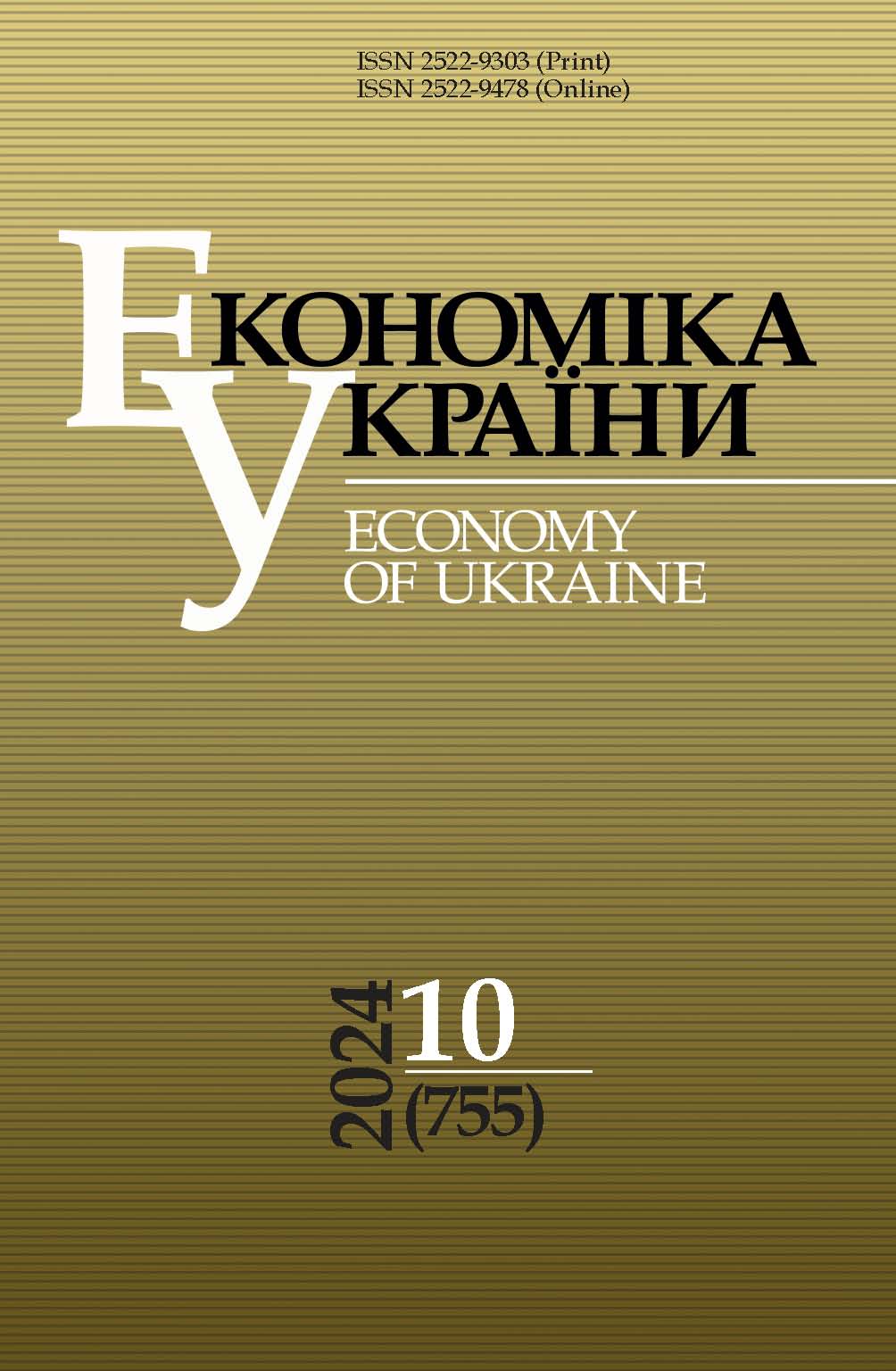FINANCIAL SECURITY UNDER MARTIAL LAW AND IN THE PERIOD OF UKRAINE’S POST-WAR RECOVERY
DOI:
https://doi.org/10.15407/economyukr.2024.10.045Keywords:
financial security; stability; budget; income; budget expenditures; deficit; inflation; debt; financial systemAbstract
Definitions of the term "financial security" are analyzed. The authors’ own generalized definition of the term "financial security of the state" is given. The problems of filling the budget in wartime are revealed. The 13-year dynamics of the formation of revenues and expenditures of Ukraine’s state budget is analyzed. A significant increase in the deficit of the state budget of Ukraine with the beginning of a large-scale war compared to the pre-war period has been proven. The parameters of Ukraine’s public and publicly guaranteed debt for the period 2021-2023 are analyzed, the provisions of the Medium-term public debt management strategy for 2024-2026, which takes into account the new economic reality that came with the beginning of the war, are studied.
It is noted that financial security is achieved thanks to the stabilization of the financial system, improvement of its mechanisms, which will allow to respond adequately to challenges and threats both in peacetime and under martial law. Ways to strengthen the financial security of the state during the war and in the period of Ukraine’s post-war recovery have been mapped out. It is noted that the government makes certain efforts to ensure the smooth functioning of the financial system, which is the bedrock of the stability of the state's financial security. Emphasis is placed on the importance of ensuring social and economic security. As emphasized in the paper, there’s a strengthening of the state’s protectionist role with the use of the Keynesian model in economic regulation, in particular, through the wide application of methods and tools for fiscal stimulation of business activity, development of entrepreneurship, regulation of population employment, investments and savings, as well as through stimulating the introduction of innovations. The utilization of these levers will allow to restore the state’s economic potential, lost during the war, to increase the financial space, to ensure the restoration and stable dynamics of Ukraine’s development during the reconstruction period; will contribute to protecting the domestic market not only from war-associated external threats and challenges, but also from the existential risks of the globalized world, strengthen the financial security of the country now and in the future.
References
Heyets, V. (1998). Concept of economic security of Ukraine. Economist. No. 7-9. P. 63-82 [in Ukrainian].
Baranovskyi, O. (2004). Financial security in Ukraine (assessment methodology and mechanisms for ensuring). Kyiv. 759 p. [in Ukrainian].
Sukhorukov, A. (2004). Problems of financial security of Ukraine. Kyiv. 117 p. [in Ukrainian].
Yermoshenko, M. (2001). Financial security of the state: national interests, real threats, strategy of ensuring. Kyiv. 309 p. [in Ukrainian].
Ryzhkova, A. (2022). The role and place of financial security in the system of strengthening economic security of the state. Scientific Notes of the "KROK" University. 3(67). 56-61. https://doi.org/10.31732/2663-2209-2022-67-56-61 [in Ukrainian].
Mochernyi, S., Larina, Ya., Ustenko, O., Yuriy, S. (2006). Economic encyclopedic dictionary. In 2 vols. Vol. 2. S.V. Mochernyi (Ed.). Lviv. 568 p. [in Ukrainian].
Radionov, Yu. (2015). Financial security Ukraine: problems and ways to ensure. Economy and State. No. 11. P. 55-59. URL: http://www.economy.in.ua/?op=1&z=3361&i=13 [in Ukrainian].
Chubenko, A., Loshytskyi, M., Pavlov, D. et al. (2018). Glossary on prevention and counteraction to legalization (laundering) of criminal proceeds, terrorist financing, financing of proliferation of weapons of mass destruction and corruption. Kyiv, Vaite. 826 p. URL: https://finmonitoring.in.ua/wp-content/uploads/2018/12/terminologichnij-slovnik_finmonitoring.pdf [in Ukrainian].
Radionov, Yu. (2022). Public finance in ensuring stability of the country’s financial system. Economy of Ukraine. 65. 9 (730). 77-98. https://doi.org/10.15407/economyukr.2022.09.077 [in Ukrainian].
Zhukova, L., Shabaldas, N. (2021). The impact of the budget deficit on the financial security of Ukraine. Investment: Practice and Experience. Vol. 23. P. 11-16. URL: https://nayka.com.ua/index.php/investplan/article/view/221/221 [in Ukrainian].
Morhun, N., Shevchuk, O., Marchevskyi, S. (2023). Functions of the state in providing economic security. Analytical and Comparative Jurisprudence. https://doi.org/10.24144/2788-6018.2023.02.47 [in Ukrainian].
Serogina, D., Bazetska, H., Zhovtyak, H. (2023). Global experience of post-war economic recovery of territories. Economy and Society, (48). https://doi.org/10.32782/2524-0072/2023-48-36 [in Ukrainian].
Reinert, E. (2008). How rich countries got rich… and why poor countries stay poor. Little, Brown Book Group. UK Edition. 400 p.
Oleshko, А., Budiakova, O., Kvas, V. (2022). Regulatory role of the state in the recovery of the national economy. Economy & State. No. 8. P. 15-18. https://doi.org/10.32702/2306-6806.2022.8.15 [in Ukrainian].
Downloads
Published
How to Cite
Issue
Section
License
Copyright (c) 2024 Publisher PH "Academperiodyka" of the NAS of Ukraine

This work is licensed under a Creative Commons Attribution-NonCommercial-NoDerivatives 4.0 International License.



